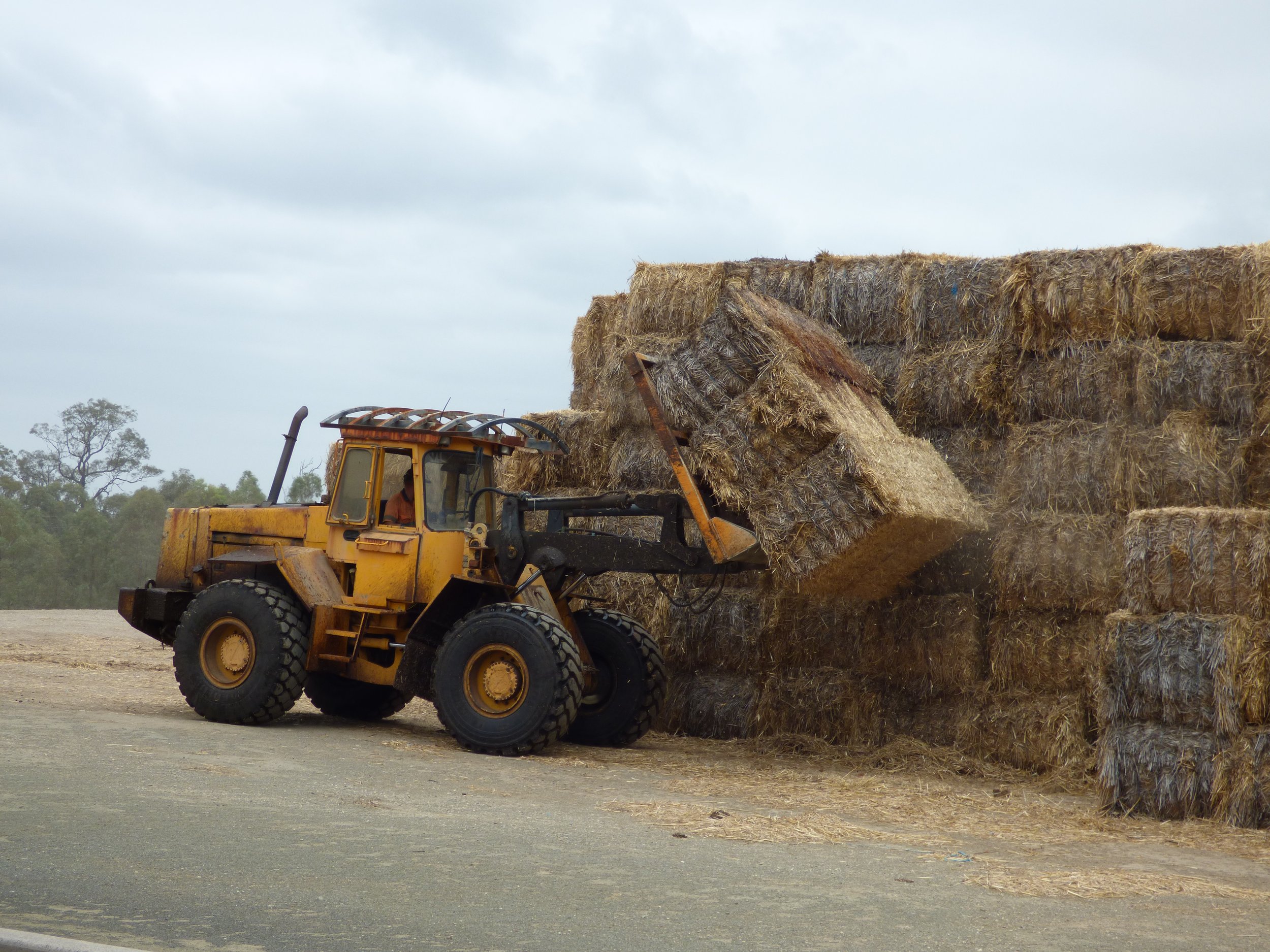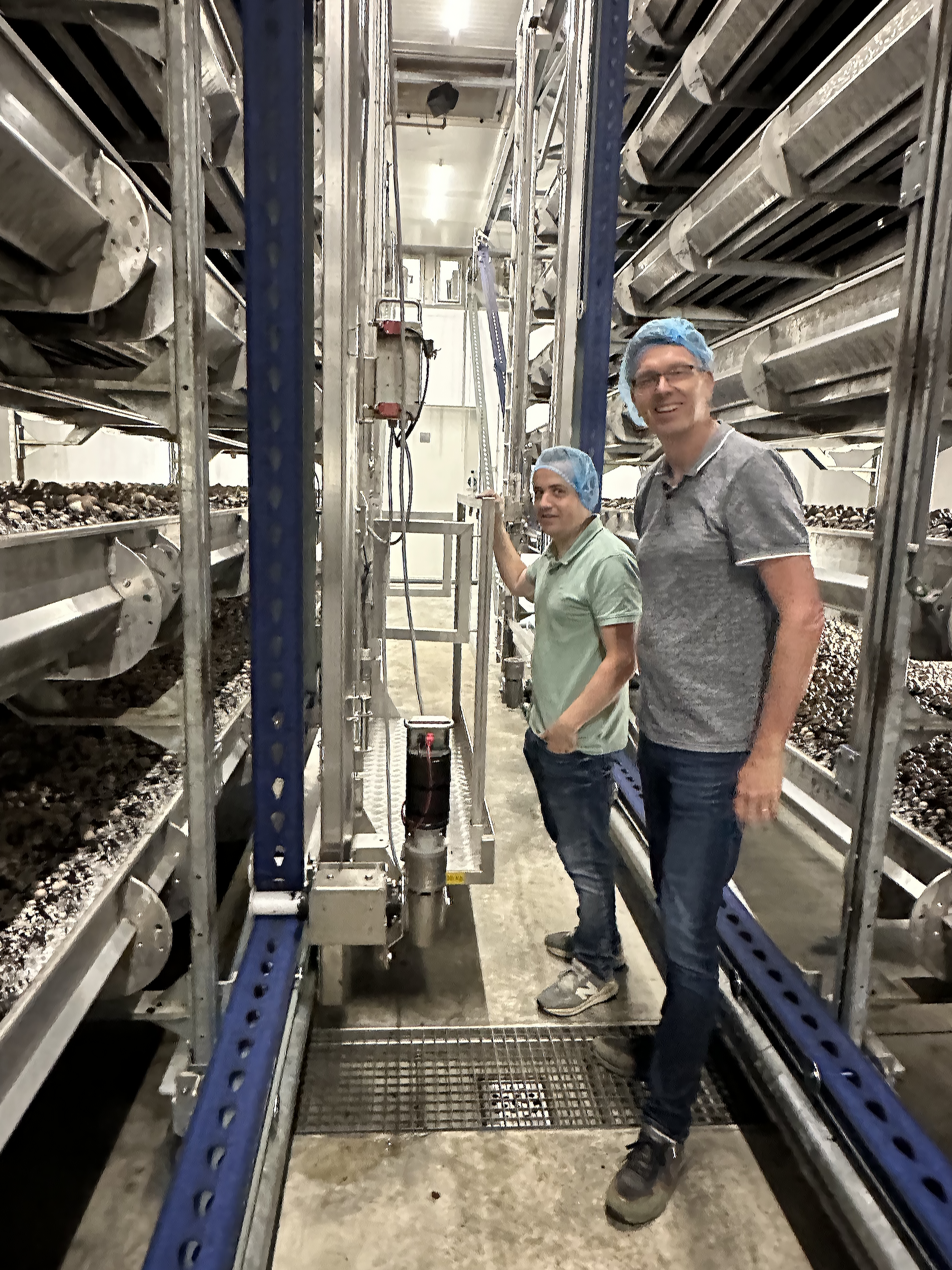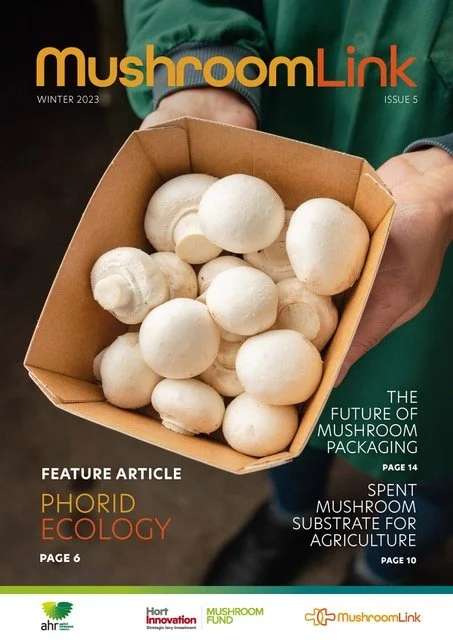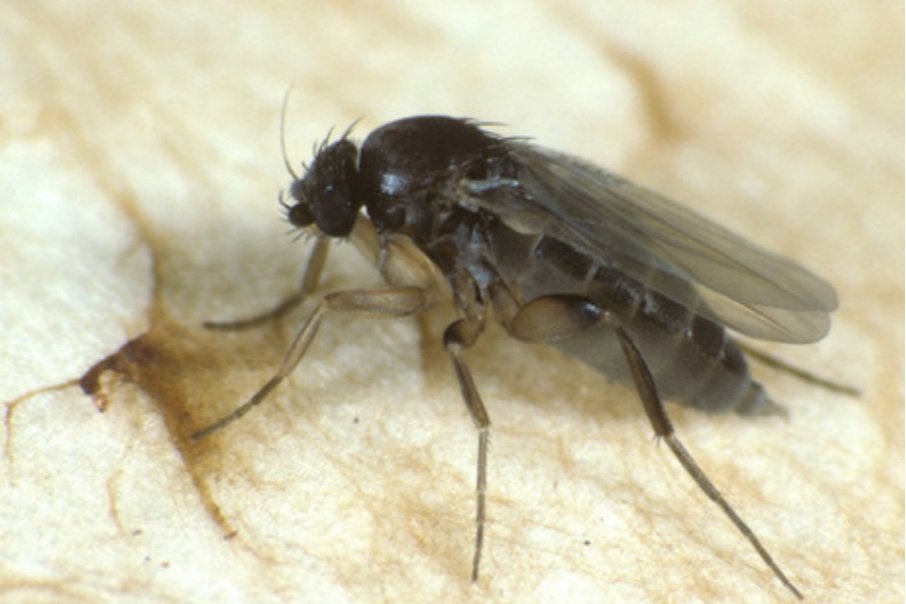Project MU22010 – Mushroom International Study Tours – Inbound and Outbound
Part of the in- and outbound International Study Tours project, the inaugural Mushroom Production workshop, facilitated by Erik de Groot, was held in Adelaide and Sydney at the end of August
Figure 1: Robert Tolson at Premier Mushrooms explaining the room-filling procedure and machinery on his farm (Umberto Calvo)
US-based international consultant and mushroom expert Erik de Groot delivered the 2-day workshops to industry members eager to learn.
Elbows deep in compost and mushrooms since his childhood in the Netherlands, Erik’s knowledge and experience range from compost production to harvesting and everything in between, with clients spread across five continents.
With the aim to educate and inspire the Australian mushroom industry and promote collaborative problem solving, attendees were asked to work together in small groups. Participants were split into these groups depending on their role (compost production, growing, harvesting) to encourage conversation within their areas of expertise and generate new ideas and solutions to current issues.
The first day of the workshop focussed on compost production, phase II and III compost, tunnel and growing room filling, and the optimal conditions of the various stages (temperature, humidity, ventilation). The attendees involved in compost production were the most active throughout the first day, while growers and harvest managers were able to better understand the dynamics of the phases that precede their entry into the crop cycle.
Figure 2: Attendees were invited to "have a feel" of good quality peat with adequate moisture (Umberto Calvo)
Day 1 also included a farm visit to Costa Monarto in South Australia and Premier Mushrooms in the Hawkesbury, with the farm staff showing the facilities, machinery, and explaining the various steps of their mushroom production and management.
The second day was centred on growing and harvesting practises to optimise yield and quality, with a particular focus on harvest efficiency and planning.
At the end of the session each group had to elaborate on the actions they were planning on taking back to their farm with the newly acquired knowledge from the workshop.
The event was very well received by all attendees, both thanks to the broad scope of themes and the opportunity to expand their network vertically with people from their own farm and peers across different farms.
The opportunity to network with colleagues from different parts of one’s own workplace was viewed as an important outcome. Communication and collaboration throughout every step of the process, from compost production to growing and harvesting, can have a big impact on the overall result, and ultimately determine the farm’s and farmer’s bottom line.
At the end of the two-day workshop the participants were asked to complete an evaluation and suggestion form, which will assist AMGA as it plans the next events. Attention will be placed on the topics and issues identified by the Australian mushroom industry as the most relevant right now.
Additional resources
Mushroom international study tours – inbound and outbound (MU22010)
Key research provider: Australian Mushroom Growers’ Association
What's it all about?
This project delivers a range of inbound and outbound international study tours for the mushroom industry. Through these activities, the Australian mushroom industry will increase their knowledge of global innovations and develop stronger networks with international peers and researchers.
The project team will organise outbound study opportunities for industry personnel, particularly emerging leaders, to attend international conferences and educational farm tours while strengthening the existing connections with international mushroom organisations.
International topic experts or innovators will also be invited to visit Australia to conduct educational workshops and present at domestic industry events.
A balanced advisory panel will choose the successful applicants, who will receive a partially funded scholarship to participate in the outbound study tours. More information will be made available through MushroomLink and AMGA communications.
Recipients will be required to showcase key learnings within the mushroom industry communications program, and mushroom industry conference, for knowledge and information transfer to the broader industry.
Associated resources
Global perspectives from Erik de Groot
Image courtesy of the AMGA 2023
Erik de Groot - Consultant Mushroom Business
Following his recent trip to Australia, where he delivered training workshops to local growers, Erik de Groot took some time to chat with MushroomLink’s Dr Jenny Ekman.
From a childhood spent in a small village of only 4000 people (but with 15 mushroom farms!) – to becoming a sought-after global mushroom consultant working everywhere from Dubai to China, Europe, Australia, South America and the US – Erik has unique insights into how the industry differs from place to place.
In this podcast, Erik chats about the various approaches to mushroom production around the world, current trends and challenges, and where he thinks Australia sits regarding sustainability and quality (spoiler alert – Australian mushrooms are very good!).
Erik's trip to Australia and subsequent workshops were part of the Hort Innovation project MU22010 – Mushroom International Study Tours – Inbound and Outbound, funded through the mushroom levy and contributions from the Australian Government.
Geoff Price and the American mushroom industry - part two
Geoff Price Giorgi Mushroom Company.
Haven’t listened to part one yet? Listen to it here.
Geoff Price may be the son of our own mushroom-growing legend Graham Price, but he has definitely forged his own way in the industry. A mushroom grower since he was eight years old, perhaps it is not surprising he’s now not only technical director of Giorgi Mushroom Company in Pennsylvania, but also chair of the American Mushroom Institute. Interview by Dr Jenny Ekman
In part two, Jenny and Geoff pests and diseases, food safety and American mushroom marketing.
The story behind swarming red pepper mites
Red pepper mites (RPM) are tiny 8-legged spider-like creatures that can be seen without magnification particularly when they swarm on the top of casing and /or mushrooms.
In literature the Australian species of RPM is identified as Siteroptes mesembrinae. You will also see the descriptor Siteroptes mesembrinae syn Pygmephorus mesembrinae.
This article was originally produced for the Australian Mushroom Journal 2020 Issue 3
MushroomLink Bulletin August 2023
In this edition:
Feature: The future of mushroom packaging
Feature: A lifecycle analysis for the mushroom industry
Webinar: A scoping study to review fungi-based global innovations
Podcast: Geoff Price and the American mushroom industry - part one
Resource: Mushroom Virus X Syndrome
Event: November webinar - save the date
MushroomLink Bulletin July 2023
In this edition:
Feature: Making a vitamin D claim.
Feature & webinar: Spent mushroom substrate
Feature: Improving the food industry menu with mushrooms
Podcast: Going Dutch - New mushroom technology from the Netherlands
Resource: Troll doll fact sheet
Event: November webinar - save the date
Going Dutch: New mushroom technology from the Netherlands
Tom Peeters GTL Europe
Recently Dr Jenny Ekman visited the Netherlands where she spoke with GTL Europe's Tom Peeters.
Tom and Jenny talk about a new mushroom farm in the Netherlands and how new technology has been implemented. They discuss tilting shelves and transferable shelves and future-proofing packing to be consistent with new robotics.
This podcast is part of the Hort Innovation funded project MU21003: Mushroom industry communications programme. It was funded through the Mushroom levy fund and contributions from the Australian Government.
A tilting shelf system
Tom Peeters (Left) and Denis (Right)
MushroomLink Bulletin June 2023
In this edition:
Winter magazine out now
Feature: Phorid ecology and management
Food safety FAQ’s
Podcast – Revisit our podcast on risk management
Marketing: Mushroom meat tray
MushroomLink Magazine Issue 05
The MushroomLink magazine Autumn edition is available now online. If you’re not yet receiving our magazine, subscribe here for your e-copy.
Articles:
Food Safety FAQs - your questions answered
Clare Hamilton-Bate has had more to do with food safety certification than just about anyone in Australia. Clare has also been an advisor to the mushroom industry for over 10 years. MushroomLink recently talked to Clare about tips and traps for QA managers on mushroom farms.
A visit from the auditor has been known to strike fear into the heart of even the most organised mushroom business QA manager. This is not necessarily because records are not in order, or practices are in any way unsafe. It has more to do with uncertainty about the process itself. People may wonder “What will the auditor ask?” “What evidence will I need to provide?” “What haven’t I done?” “What do I do if I get a lot of corrective actions?”. It can be like going for an exam without knowing the scope of the subject. Clare Hamilton-Bate has had more to do with food safety certification than just about anyone in Australia. Clare has also been an advisor to the mushroom industry for over 10 years. MushroomLink recently talked to Clare about tips and traps for QA managers on mushroom farms.
The future of mushroom packaging
As consumers and regulators become increasingly concerned about sustainability, the Australian mushroom industry needs to explore alternative packaging solutions to meet the growing demand for environmentally friendly products. With fewer than 50 commercial growers, the mushroom industry has the opportunity to adopt sustainable packaging solutions across the board, positioning itself as a leader in Australian horticulture.
As consumers and regulators become increasingly concerned about sustainability, the Australian mushroom industry needs to explore alternative packaging solutions to meet the growing demand for environmentally friendly products. With fewer than 50 commercial growers, the mushroom industry has the opportunity to adopt sustainable packaging solutions across the board, positioning itself as a leader in Australian horticulture.
Improving the food industry menu, with mushrooms
A collaboration between Nutrition Research Australia (NRAUS) and the AMGA is working hard to show the benefit of adding mushrooms to the menu, not only to improve the palatability of institutional meals, but to boost their nutritional offering as well. Initial research reveals the Australian food industry has a lot more to learn about the health benefits of the mighty mushroom, with taste and culinary benefits overshadowing the vast nutritional benefits of mushrooms in the nationally accredited commercial cookery curriculum.
A collaboration between Nutrition Research Australia (NRAUS) and the AMGA is working hard to show the benefit of adding mushrooms to the menu, not only to improve the palatability of institutional meals, but to boost their nutritional offering as well. Initial research reveals the Australian food industry has a lot more to learn about the health benefits of the mighty mushroom, with taste and culinary benefits overshadowing the vast nutritional benefits of mushrooms in the nationally accredited commercial cookery curriculum.
A life cycle analysis of the mushroom industry
It’s one thing to claim sustainability, and quite another to prove it. A new R&D levy-funded project is bringing ‘life cycle thinking’ to the Australian mushroom industry, which will highlight the strengths and weaknesses in mushroom sustainability across the industry. With recent media attention and a new investigation by the ACCC exposing greenwashing, it is more important than ever to understand the real impact of a business and the effectiveness of any sustainability measures.
It’s one thing to claim sustainability, and quite another to prove it. A new R&D levy-funded project is bringing ‘life cycle thinking’ to the Australian mushroom industry, which will highlight the strengths and weaknesses in mushroom sustainability across the industry. With recent media attention and a new investigation by the ACCC exposing greenwashing, it is more important than ever to understand the real impact of a business and the effectiveness of any sustainability measures.
Exploring the potential of spent mushroom substrate for sustainable agriculture
To maintain consumer appeal and a competitive edge, business must strive for that magical triple bottom line of social, economic and environmental sustainability. Striking that balance is an ongoing challenge due to a fickle global economy and increasingly unpredictable weather patterns.
To maintain consumer appeal and a competitive edge, business must strive for that magical triple bottom line of social, economic and environmental sustainability. Striking that balance is an ongoing challenge due to a fickle global economy and increasingly unpredictable weather patterns.
Can you claim vitamin D on mushrooms?
Vitamin D deficiency is an increasing public health problem in Australia, with almost a quarter of Australians deficient. Mushrooms provide a unique solution to address this deficiency and would lend some ‘nutrition heft’ to any marketing campaign. However, before claims can be made about vitamin D, it is necessary to take a closer look at the vitamin and the specifics of the food regulations.
Vitamin D deficiency is an increasing public health problem in Australia, with almost a quarter of Australians deficient. Mushrooms provide a unique solution to address this deficiency and would lend some ‘nutrition heft’ to any marketing campaign. However, before claims can be made about vitamin D, it is necessary to take a closer look at the vitamin and the specifics of the food regulations.
Phorid Ecology and Management
Flies in mushroom crops are a persistent, annoying, and occasionally, very damaging issue that all growers will face at some time. Most research has focussed on sciarids (Lycoriella spp.), often the most common species present. The maggots feed on organic matter in compost and readily adapt to captivity, making research relatively easy. Mushroom phorid flies may be a minor problem on most Australian farms, but in many countries – including Spain, Turkey, India, the UK and the US – they are a major pest. Yield losses of 10 to 40% have been widely reported. Some Australian farms are now also reporting persistent populations of these flies.
Flies in mushroom crops are a persistent, annoying, and occasionally, very damaging issue that all growers will face at some time. Most research has focussed on sciarids (Lycoriella spp.), often the most common species present. The maggots feed on organic matter in compost and readily adapt to captivity, making research relatively easy. Mushroom phorid flies may be a minor problem on most Australian farms, but in many countries – including Spain, Turkey, India, the UK and the US – they are a major pest. Yield losses of 10 to 40% have been widely reported. Some Australian farms are now also reporting persistent populations of these flies.
Sustainable pest and disease management
Pest and disease outbreaks pose a risk to any horticultural business, and the Australian mushroom industry is no exception. Outbreaks can result in significant financial losses for the grower, and broader reputational damage to the sector as a whole.
As consumers increasingly demand produce that is clean and green, a sustainable approach to pest and disease management will help protect market access for the industry into the future.
A new Hort Innovation project, led by Dr Aimee McKinnon from Agriculture Victoria, investigates effective alternatives to complement current pest and disease management strategies for the mushroom industry.
Read full article in MushroomLink Issue 4
National mushroom virus survey - update
The vast majority of mycoviruses – the viruses which are naturally widespread throughout both cultivated and wild fungi – cause no problems to their host. But occasionally, combinations of virus particles interact, causing quality and yield issues.
Pathogenic viruses can be hard to detect in mushroom crops. They can replicate unseen and undetected, establishing large disease reservoirs on-farm. Early symptoms can go unnoticed or be ignored. For example, sporadic brown mushrooms appearing in white button crops being dismissed as just ‘one of those things’.
The delay in identifying the causal ‘organisms’ was one of the key factors leading to the devastating impacts of MVX Syndrome in Europe. Early detection and appropriate intervention is key to successfully mitigating the effects of these serious pathogens.
Australia has a long history of virus disease. La France was first recorded in this country in 1969 and there have been sporadic damaging outbreaks recorded over the years.
In 2021 a farm reported a disorder expressing La France-like symptomology. However, samples sent to an external diagnostic laboratory did not detect the La France virus. A second sample was tested for Mushroom Virus X (MVX) Syndrome viruses. This test detected the AbV6 virus particle, which is associated with MVX Syndrome.
A preliminary survey of mushrooms from supermarkets, together with selected farm samples, provided results consistent with the findings from the farm outbreak samples. After consultation with Dr Helen Grogan (Teagasc in Ireland, the leading authority on MVX Syndrome), and discussions with the MU16003 project reference group, it was decided to offer a nation-wide survey to the industry to determine the extent of virus contamination in Australian button mushroom crops.
Read the full report from the Pest and Disease Team, Dr Warwick Gill and Judy Allan in MushroomLink Issue 2
It’s a wrap on MU16003 Pest and disease management and research services
Over the last five years, Warwick Gill (University of Tasmania) and Judy Allan have led the levy funded project MU16003 Pest and disease management and research services, creating an exhaustive and detailed body of knowledge for the Australian mushroom industry.
The team have researched and collated information on current and emerging mushroom pests and pathogens, as well as how to recognise, treat and manage them. They have also focussed strongly on communicating their findings through a variety of engaging formats. The legacy is an impressive and invaluable information resource.
Most of the resources created through the project are available via the AGORA website (agora.australianmushrooms.com.au, note that this is password protected), with a few highlights presented here.
Read more about their research highlights and top tips in MushroomLink Issue 1








































